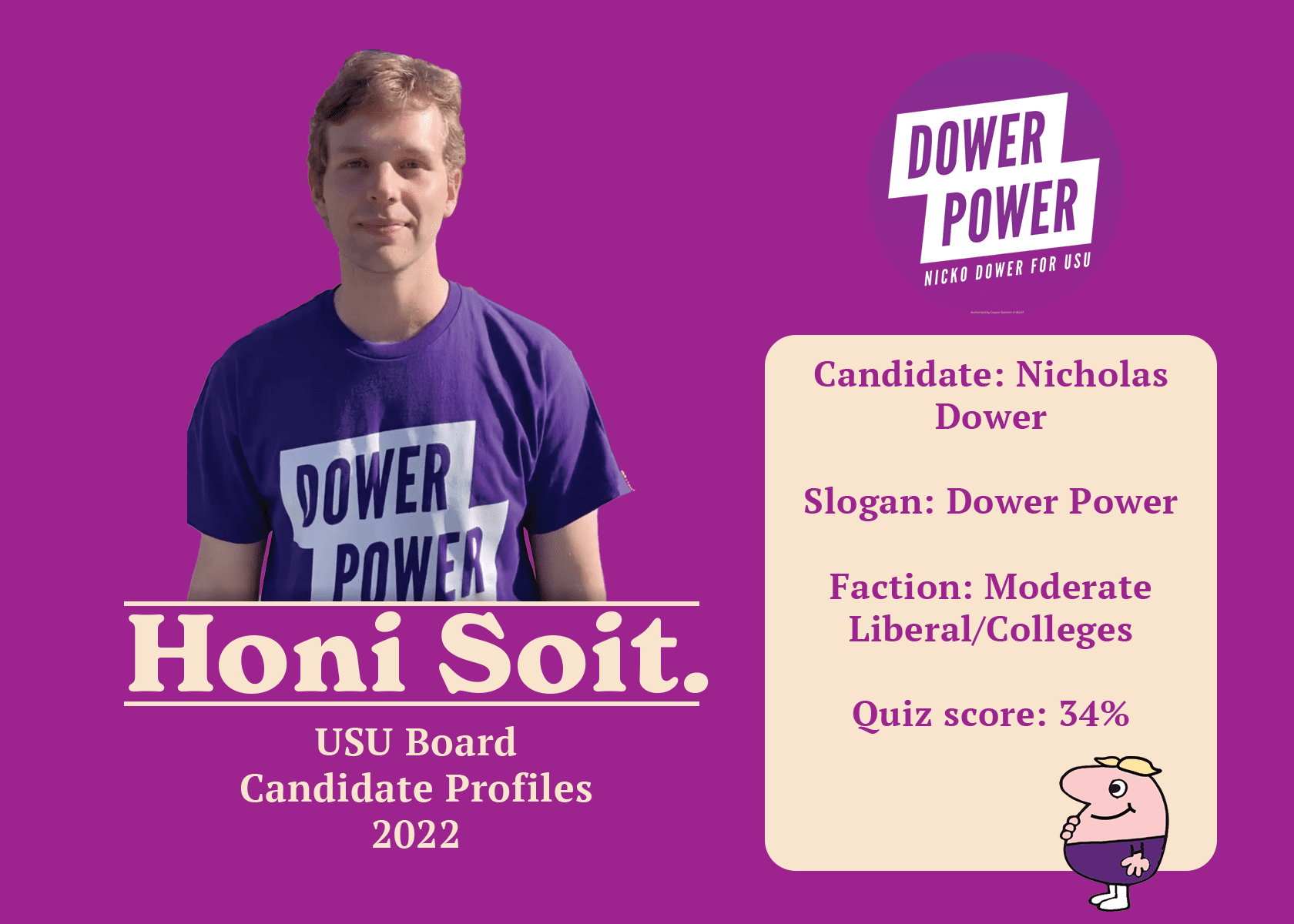Slogan: Dower Power
Colour: Purple
Quiz score: 34%
Faction: ModLib
Following the tide of political winds, Dower is a Liberal running on a platform of cost of living, transparency, and the environment. His campaign aims to give a shot to the arm of campus life after two years of disruptions, with policies focused on expanding accessible food and drink options, and increasing outreach to bring more students into the clubs and societies program. He is currently the Vice-President of USyd’s Conservative Club and Secretary of the Freedom Club.
Dower’s quiz score of 34 per cent placed him fifth out of six of the candidates, and displayed a bare bones knowledge of the personalities and institutional operations of immediate relevance to the USU and campus generally.
Where he fell short was on campus communities outside that of his background, being unable to name the Deans or Presidents of student societies for faculties beyond the humanities. He also showed minimal familiarity with the sorts of concessions and support services available to low-SES students, including the rate of Youth Allowance or the location of the USU’s embattled FoodHub program.
Dower felt he represents a more “mainstream” voice on campus, citing “consistently low turnout” in SRC and USU elections as an indicator of the need for this sort of representation. Last year saw the largest number of votes cast in an SRC election, and the 2019 USU election was the largest number of votes in any student ballot at USyd, contesting his suggestion that more moderate candidates are essential to higher engagement.
As a prospective elected student representative, Dower could not name the current SRC Education Officers, nor was he familiar with the current NTEU leaders or demands. He is amenable to the Board taking political stances “if in the interests of students”, citing the Religious Discrimination Bill as a recent example.
For Dower, fossil fuel divestment was an area of particular political importance, describing it as “a massive cultural issue for our generation.” Specifically, he is in favour of direct divestment and divestment from funds with fossil fuel ties, and a move to funds with ESG (environment, social and corporate governance) portfolios. When pushed on whether he would be in support of divesting from funds that had decarbonisation plans rather than no ties, he indicated he would need more information but reaffirmed his commitment to divestment.
Dower sees the Union primarily as a services provider, and focused mainly on the C&S program when identifying areas to improve the experience of its members. He suggested poor marketing and a lack of communication with the colleges as current barriers to student engagement, holding improved and considered outreach up as policies central to his strategy.
Dower presented, like almost every other candidate, a promise of cheaper food, as well as extended happy hours (which would go against the University’s current alcohol policy), increased transparency and support for divestment.
Broadly speaking, he holds positions typical of centrist USU candidates, but offers impressively little when it comes to the mechanisms of implementation. For example, when asked about revues on campus, Dower cited no specific way to improve engagement, but offered his support. He also stated he would like to see more non-college students attend the intercollegiate “Palladian Cup” (the what?). Honi fails to see how more non-college students attending the Palladian Cup is important, but is nonetheless interested to hear what his plan is. His support for transparency was limited to “cultural change” within the Board, and there “aren’t any conceivable circumstances” in which he’d break his fiduciary duty.
Dower advocates for expanding consent and bystander training modules, which are already mandatory for directors, to be made mandatory for all staff and society executives, and for them to be led by “expert groups”. He hoped for “greater oversight” of events and camps, and supported, in principle, the deregistration of clubs found to have cultural failings when it came to safety and harassment.
Dower is currently a resident at St Paul’s College and likened the stated aims of the USU to those of the colleges. He explained a desire to see college residents engage more with campus life. Honi is unsure how college students, who literally live on campus, should engage more with campus life, nor how Dower’s plan for more on-campus college events is of interest to the 34,000 undergraduate USyd students he aims to represent. It also doesn’t seem to impact the USU’s membership, who do not fund nor get invited to college events.
Listen to Nicholas Dower’s’ interview and read the transcript here.





